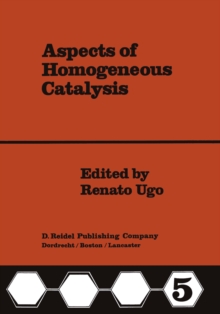
Aspects of Homogeneous Catalysis : Vol. IV Paperback / softback
Edited by R. Ugo
Part of the Aspects of Homogeneous Catalysis series
Paperback / softback
Description
Another approach is via the peracid route [10,Il], whereby propylene is epoxidized by an organic peracid, usually peracetic acid.
The latter is prepared either by reaction of acetic acid with hydrogen peroxide, or by autoxidation of acetaldehyde. - (3) - (4) ---I...MeC0 H MeCHO +02 3 /'\. (5) MeC0 H + MeCH=CH ---I ...MeCH-CH + MeC0 H 3 2 2 2 Although this method has been extensively studied [10, II] and is often the method of choice for laboratory scale preparations of epoxides, it has not been widely applied on a commercial scale.
The reasons are probably to be found in the hazards associated with the handling of these explosive and corrosive peracids on an industrial scale.
Nevertheless, several companies continue to groom this method for future commercialization [12].
With organic hydroperoxides becoming available as commercial chemicals, in the last decade propylene oxide process technology has seen the commercializa- tion of the hydroperoxide route.
Such a process, developed by Halcon Interna- tional and Atlantic Richfield, is that often referred to as the Halcon or Oxirane process [13]. It involves the reaction of propylene with an alkyl hydroperoxide in the presence of a soluble, metal catalyst (usually a molybdenum compound).
The alkyl hydroperoxide is prepared by autoxidation of an appropriate hydro- carbon.
For example, tert-butyl hydroperoxide (TBHP) is prepared by autoxida- tion of isobutane. (6) Reaction with propylene gives propylene oxide and tert-butanol as a coproduct.
Information
-
Item not Available
- Format:Paperback / softback
- Pages:212 pages, 212 p.
- Publisher:Springer
- Publication Date:08/10/2011
- Category:
- ISBN:9789400983731
Information
-
Item not Available
- Format:Paperback / softback
- Pages:212 pages, 212 p.
- Publisher:Springer
- Publication Date:08/10/2011
- Category:
- ISBN:9789400983731










